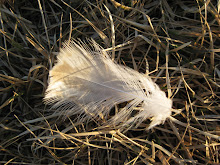Before I went to EAT I had an abstract idea of what permaculture was, but if someone had asked me to define it verbally I wouldn't have been able to (at least very clearly.) This indeed happened a couple of days before I left. One of my customers at work asked me what permaculture was. I started fumbling for words and decided to defer to my friend who was also sitting at the counter. Since she is an organic gardener, I thought she would be able to do it better than me. "Isn't it just common sense?" she said. "Planting and organizing things so they work together." Yes, in a nutshell, but as I discovered at EAT, permaculture is far more than a system of gardening, it is an entire system of thought, a way of thinking that is based on common sense. Unfortunately, many of us in our disposable culture have lost this common sense. Permaculture gives a chance to return to our instincts, to form our thoughts by connecting with the needs of the earth instead of the needs our disembodied minds create.
Stacking functions is common sense. I bet you probably do more of it than you already realize, even if it is just downcycling things. For instance, I use plastic shopping bags as bathroom trash bags. Obviously this doesn't take care of the problem of trash in the first place, but it is a beginning in changing the way we think. If we see everything as having more than one potential use, (the definition of stacking functions) we are creating a shift in our thinking which can lead to the sustainable world more and more of us want to see.
I used to argue with my friend who worked at the dump about recycling. He said it was just a band-aid. Something cooked up to make people feel good that they were doing something about "the environment." He was the first person who pointed out to me that we were in deep shit. Since he worked at the dump, he definitely had some earned authority. He was the first to tell me it was our current system that had to go. I was shocked at first. At the time I hadn't really perceived how deep our problems were. I was naive--meaning I didn't know the facts, and believed in the inherent goodness of my action. Now I am innocent, meaning I know the facts, but still believe in this goodness. So I recycle, knowing it is not going to make the difference I once thought it would, but that my action is a motion toward shifting the world toward sustainability, even if it is only in a symbolic way.
A lot of things we can do are like this. The Kyoto Accord, for example, which for those who don't know, is an international treaty to reduce greenhouse gas emissions. Even though the amount of reduction it calls for is so small it would be purely symbolic in light of what our atmosphere needs in order to be healthy, it is still important because it sends a message to the citizens of the world that the governments of our nations care about the air we breathe, no matter what country we live in. The U.S., the greatest producer of greenhouse gases on the planet, has refused to sign the accord, which went into effect in January.
Stacking functions is something I do in every blog. I disseminate information and I clarify my own thinking about the world and myself. Isn't this what an essay should do? The word essay comes from the French essayer, to try. Try and look for ways to stack functions. I bet your common sense will find lots of ways, and then eventually you'll start designing your life so that everything will have more than one function. That's my plan, at least.
Here's a way I stack functions on a daily basis. Every time I chop vegetables I throw the stalks or skins that I'm not going to eat in a bag I keep in the freezer. When I have enough I boil them down to make vegetable stock. I still don't have a wormbin or compost yet, but when I do I will toss them in, thus getting three uses out of them.
Just a note--there is another meaning for stacking functions that relates specifically to garden design. Otherwise known as vertical stocking, or multi-tiered garden design, e.g. creating a canopy of plants with trellising or espaliering trees. Espaliers are trees that are pruned to grow out instead of up, forming a hedge of fruit. The idea is to have your garden look like nature, which generally does not grow in horizontal rows like the gardens we are accustomed to planting.
Subscribe to:
Post Comments (Atom)

No comments:
Post a Comment